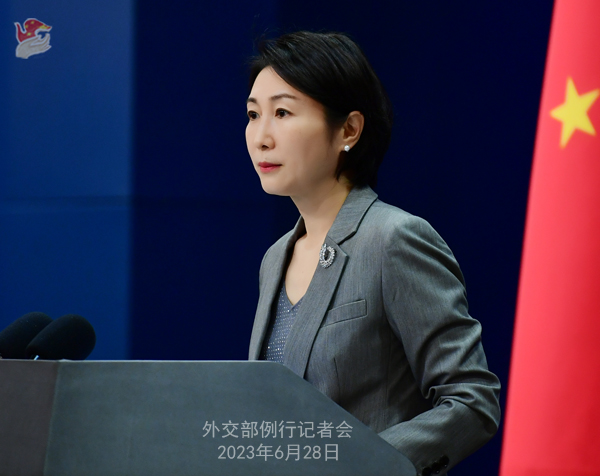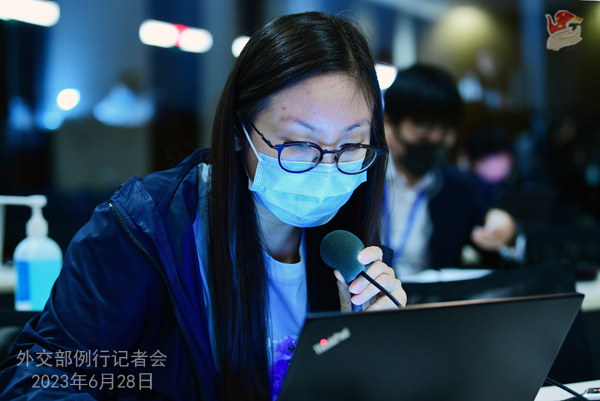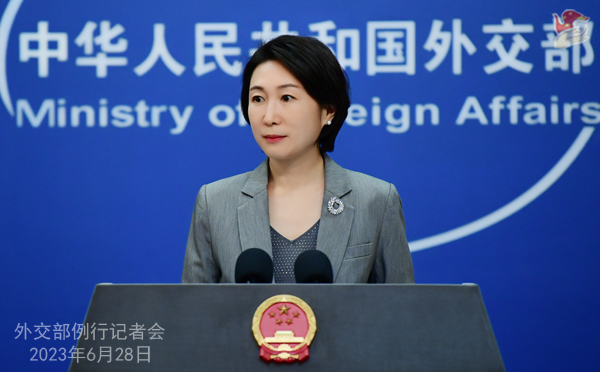| Foreign Ministry Spokesperson Mao Ning’s Regular Press Conference on June 28, 2023 |
| 2023-06-28 17:28 |
|
CCTV: An ROK media outlet recently reported that according to an anonymous source, the Japanese government obtained beforehand the draft report of the IAEA Task Force reviewing Japan’s discharge of treated water from the Fukushima Daiichi Nuclear Power Plant and raised substantive revision suggestions, exerting inappropriate influence on the conclusion of the final report. The media report also says that Japanese officials made political donations worth over EUR 1 million to the staff of the IAEA Secretariat. Do you have any comment? Mao Ning: The report has come to our serious attention. The Japanese government has a responsibility to give a credible explanation and the public also needs a response from the IAEA Secretariat. What’s in that report has increased the world’s concern over Japan’s discharge of nuclear-contaminated water into the ocean. People have every reason to question the impartiality and objectivity of the final review report of the IAEA Task Force. China’s position on the discharge of the nuclear-contaminated water into the ocean is consistent. The discharge affects the common interests of the international community. It is not Japan’s domestic affair. China urges Japan to take seriously both international and domestic concerns, stop forcibly proceeding with its ocean discharge plan, handle the nuclear-contaminated water in a science-based, safe and transparent way and subject itself to rigorous international oversight. We also hope that the IAEA Secretariat will act in an objective, professional and just manner, fully respect and adopt the views of experts of all parties in the Task Force and present a review report that can withstand the test of science and history, instead of endorsing Japan’s discharge plan. The world is watching with eyes wide open. Reuters: According to reports, when asked about China supporting Ukraine’s goals of reclaiming regions now occupied by Russia, China’s envoy to the EU Fu Cong said “I don’t see why not”. Did Fu indeed say this? And is this also the Chinese government’s position? Mao Ning: China’s position on the Ukraine crisis is consistent and clear-cut. We believe that all sides need to work towards creating enabling conditions for a political settlement of the crisis through dialogue and negotiation.
CRI: According to reports, Bernardo Arevalo, a presidential candidate in Guatemala, said in an interview on June 27 that Guatemala needs to formulate its foreign policy independently based on its national interest. If he wins the election, he will seek to develop friendly relations with China and the Taiwan region on the basis of mutual respect. What’s your comment? Mao Ning: There is only one China in the world. The government of the People’s Republic of China is the sole legal government representing the whole of China. Taiwan is an inalienable part of China’s territory. Standing up for the one-China principle is the right thing to do. It has the overwhelming support of the international community and represents the trend of the world. We are convinced that more countries will choose to stand on the right side of history and make the right decision that serves the fundamental and long-term interests of their countries and peoples. RIA Novosti: The White House press corps reported that US President Joe Biden said China had huge problems, but did not go into detail. What’s China’s comment? Mao Ning: I haven’t seen the remark you mentioned. When it comes to having problems, I suppose all countries, the US included, face challenges as they work to achieve development and progress. In China’s case, with the strong leadership of the Communist Party of China, the path of socialism with Chinese characteristics and the solidarity and hard work of the Chinese people, we have the ability and confidence to tackle any challenge ahead and realize greater development. Meanwhile, we hope the US will concentrate on solving its own problems and play a constructive role in making the world stable and prosperous. Yonhap News Agency: It was reported that the newly revised counter-espionage law will come into effect on July 1. Some commented that after the implementation of the law, foreigners in China will have difficulties in searching and storing statistics of the Chinese side. There are also concerns that it will limit the reporting activities of foreign journalists. What is China’s comment? Mao Ning: Every country has the right to safeguard national security through domestic legislation, which is a universal practice. China is advancing law-based governance on all fronts and will continue to uphold the rule of law, conduct law enforcement and protect lawful rights and interests of individuals and organizations in accordance with the law. There is no need to associate the counterespionage law with reporting activities of foreign journalists. China always welcomes media outlets and journalists of all countries to conduct interviews and run stories in China in accordance with laws and regulations and we will provide facilitation and assistance to them. As long as one abides by laws and regulations, there is no need to worry.
AFP: Another question on Mr. Fu Cong. He explicitly said yesterday that Beijing could back Ukraine’s aims of reclaiming its 1991 territorial integrity, which includes Crimea—the peninsula annexed by Russia in 2014. Does the Chinese government support Ukraine’s aims of reclaiming its 1991 territorial integrity? Mao Ning: I am not aware of how Ambassador Fu Cong put it exactly. China’s position on the Ukraine crisis is consistent and clear. On the question of Crimea, we hope this issue can be resolved through political means. Beijing Daily: It is reported that after recently visiting the detention center at the Guantánamo Bay, a UN special rapporteur pointed out that the US subjects detainees to ongoing inhuman treatment and the US government should be responsible for their action, make apology and provide assistance and reparation to the victims. What’s China’s comment? Mao Ning: In the past two decades and more, it has been revealed many times that inmates were abused in the detention facility at the Guantánamo Bay, causing outrage in the international community. The US has promised time and again to close the detention center, yet till today dozens of individuals are still imprisoned in the facility at the Guantánamo Bay and only few of them have been indicted or convicted. Over the decades, the US has set up “black sites” in at lease 54 countries and regions in the name of the “war on terror” to secretly detain “suspected terrorists”, carry out arbitrary detention and use torture to extort confessions. The detention center at the Guantánamo Bay is just the tip of the iceberg. The “black sites” are a typical example of the US trampling on the rule of law and infringing on human rights. The US needs to earnestly reflect upon its deplorable record on human rights, apologize and provide reparation to the victims and hold those who authorized and inflicted tortures on detainees accountable. The Asahi Shimbun: A question on the IAEA and the treated water at the Fukushima nuclear power plant. If the IAEA releases a report with science-based assessments early next month, will China respect it? Mao Ning: I’m afraid I cannot answer this hypothetical question as the IAEA report has not come out yet. China’s position on Japan’s planned discharge of the nuclear-contaminated water into the ocean is consistent. We hope Japan will take seriously both international and domestic concerns and stop forcibly proceeding with its ocean discharge plan. We also hope that the IAEA Secretariat will act in an objective, professional and just manner, fully respect and adopt the views of experts of all parties in the Task Force and present a review report that can withstand the test of science and history.
|
 | ||||||||||||
 | ||||||||||||
|



